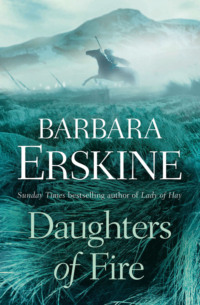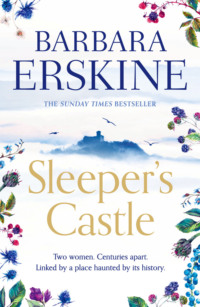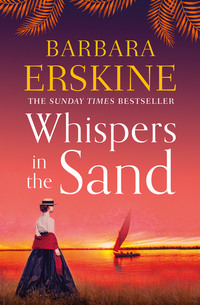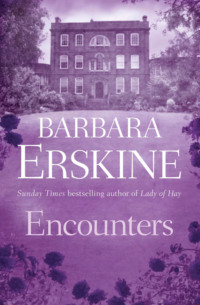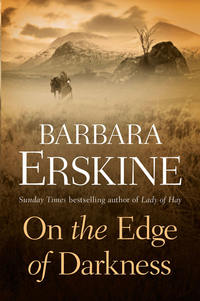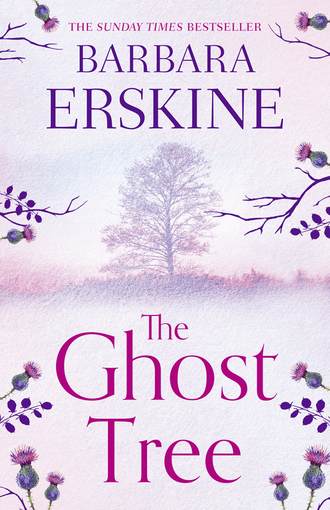
Полная версия
The Ghost Tree: Gripping historical fiction from the Sunday Times Bestseller
They sat in silence for several minutes then Finlay pushed open the door. ‘You stay here. Lock yourself in. I’ll go up to the corner and peer round. See if he’s cruising up and down the road.’
‘I’m not staying here on my own!’ Ruth reached for the door handle.
‘He’ll recognise you if he’s there.’
‘You think he won’t recognise you?’ She stared at him incredulously. ‘You spoke to him on the doorstep. And he’s not going to forget what you look like, Finlay Macdermott!’
‘Touché! Come on then.’ He reached out for her hand.
They looked round cautiously. There was no sign of Timothy’s car.
‘Do you think it’s safe?’ Ruth breathed.
‘Probably. I won’t drive straight home, just in case.’
They drove around for twenty minutes before deciding it was safe to head for Cramond. As they drew to a halt outside the mellow stone-built old house with its long driveway and broad gravelled parking area, it was already growing dark. Ruth followed him through the front door and into his kitchen. ‘Ssh!’ Finlay put his fingers to his lips. Tiptoeing across the floor, he pulled the curtains and only then did he turn on the lights.
Ruth looked round. The room was warm and full of the succulent fragrance of cooking herbs. It was years since she had been here. Then it had been with Rick and they had had the most wonderful few days in Fin’s company. The kitchen was exactly as she remembered it, with a huge oak dresser and refectory table, a bookcase stuffed with cookery books and several framed French posters on the stone walls. The only nod to modernity was a circular ceiling rack laden with shiny saucepans and utensils, and an elegant kitchen island with an attendant cluster of high stools.
‘It is lovely to be here again, Fin.’ She climbed onto a stool and accepted a glass of chilled Pinot Grigio. ‘We had such a lovely time when I came with Rick.’ She watched as he slid a dish out of the oven and checked it. Satisfied, he pushed it back, threw down the oven gloves, adjusted the heat slightly then he turned to her. ‘I’ve got something to show you. Wait there.’
The something was the writing slope. He had mended the lock and somehow removed the deep scratches from the wood. Ruth exclaimed with delight. ‘You’re so clever. You would never know it had been damaged!’
‘I enjoy doing things like that. A bit of a hobby. Open it.’
She did so. Inside was an envelope. She picked it up. ‘What’s this?’
‘Something I found when I was mending it. The blotter is made to lift up to form yet another secret cavity.’
She peered into the envelope and extricated a small folded piece of paper. ‘It’s a letter!’
‘A very old one.’
She unfolded it carefully and laid it on the table. The handwriting was small, closely crammed on the page, the ink faded to sepia. Screwing up her eyes, she could just make out the last line of the address at the top. ‘It’s Sussex. Where my grandparents lived.’
My Darling Daughter
it was signed
Your loving mother, xxx
With a grunt Finlay climbed off his stool to fetch a magnifying glass from the dresser. ‘I needed this to read it. Very charming. I’ve no idea who these people are, but it seems affectionate. Try this.’ He pushed the glass over towards her.
Ruth studied the letter. ‘I’ve no idea who they are either.’
‘Ancestors of yours?’
‘I don’t know. I suppose they must be.’ She looked up. ‘I’m going to try to construct a full family tree. But I’m not sure how to begin.’
‘You start at the bottom with you. Then go up to your mum and dad. Then up to your grandparents – on both sides if you can, to keep it fair. You can get that far, presumably?’ He grinned. ‘Then if there’s no one you can ask – cousins? Uncles and aunts? – and no birth certificates and things like that to look up, there’s always the Internet these days. And, in your case, you can start the other end, with your Lord High Chancellor himself. His wife, his children and grandchildren are bound to be easy to find as he was famous, and then you can go down from there towards you until you meet in the middle, or backwards to find out his ancestors and on up a tree full of ghosts into this glorious aristocratic jungle your father hated so much.’ He looked at her mischievously. ‘What fun. Count me in for help if I can do anything. This research of yours is a perfect way of taking your mind off the horrors of the low life that is Timothy Bradford.’
Ruth looked up at him fondly. ‘I don’t know what I’d do without you.’
‘You’d manage.’ He reached for the bottle to top up her glass. ‘Come on. Let’s eat.’
Timothy had pulled up at last at South Queensferry near the towering girders of the Forth Railway Bridge. He climbed out of the car and went to stand by the parapet, overlooking the Firth, his hands in his pockets. He shivered as the wind found its way down the neck of his jacket. He had been looking forward to telling April that he had found out where Ruth’s minder had taken her and now he had lost the trail. But there was always tomorrow. He would go and stake out Number 26 again and this time he would make sure he followed Ruth everywhere she went.
His mind went back to April. It was odd how she had gone all superstitious on him, shuddering when she tried on those rings, or whenever he mentioned the loot, anxious to be rid of it all. Thank goodness he had the sense to see that as long as they held onto it there was no possibility of anyone spotting it. It would be a shame to chuck it away. His eyes strayed out over the cold grey water. The tide was running fast and there were white-topped waves crashing onto the shingle below the wall.
He turned away and headed back across the road towards the Hawes Inn. The bright lights reflecting out over the wet road were comforting and there was just time for a pint before they closed. Inside there was warmth and food and companionship and escape from the sound of the crashing waves. He saw the door open and then close behind a man and a woman. They hesitated for a moment before the onslaught of the weather, put up their umbrellas and began to battle into the wind. It was only then he realised it was raining.
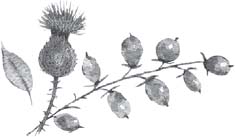
Thomas
We had always been a God-fearing family. Serious and thoughtful supporters of the Reformation, as the sennachie told us boys, and before that true followers of the old church. Back into the mists of time, as he would say, using his favourite phrase for when his memories no longer served him, although he did mention the Picts and before them the North Britons as others who had been equally devoted to their gods. We were descended from kings, he told us, and when the line of descent strayed away from the throne we supported and served our monarchs with loyalty, if not always skill.
Probity and prayer drove my forefathers into the Presbyterian camp during the Civil Wars of the seventeenth century and through that loyalty they lost their lands and went into exile, first in Holland and then over the sea to the Americas. When they returned to Scotland and the restored Stuart line was replaced, their opinions were split; my mother’s brother and my father’s cousin fought for Prince Charlie and the lands were forfeit again. My other uncle and my cousin fought against the man they called the Pretender. Although all was now officially forgiven and the various branches of the family, through fines and oaths of allegiance, were once more in favour, in their hearts I suspect more families than ours retained their loyalty to the Stuart cause.
My father was a freemason; indeed, had been grandmaster of the lodge before I was born, and my parents were devout followers of the Calvinist faith; my brothers and I were brought up to go to the kirk with scrubbed necks and hands, our well-thumbed Bibles in our hands. My sisters were even more intense in their devotion.
And me? Did I believe? Oh yes, I believed but I am not sure it was in the same things as my family. I paid careful attention to what was required, but there was a whole universe beyond the strictures of the prayer book which I could see and sense with my own faculties. The sennachie knew; my brothers knew and teased me for it. Anne and Isabella were shocked and horrified. I did not learn in time to keep quiet about what to me was obvious. I was to regret that later in my life, but I never regretted the gift of second sight that I had been given. Ever.
11

Ruth looked with delight round the cosy bedroom. Its stone walls were hung with paintings and there were heavy tapestry curtains at the window. The bedside light threw a warm glow round the room. She went to the window and drew back the curtains, opening the window and leaning out into the clear darkness. The sound of the River Almond far below, splashing over the rocky falls, filled the room. Even over the sound of the water she could hear the hooting of an owl.
Pulling her laptop from her bag she opened it.
There was an email from Harriet:
I’ve been trying to reach you on the phone. Why don’t you pick up, you infuriating woman!! I want to know what’s happening.
That was the second vivid dream Ruth had had in the last two days. She woke suddenly, disorientated, staring at the unfamiliar ceiling, trying to grasp at the memory, aware of the boy’s shock and misery, his sense of powerlessness, his disbelief that he could be so arbitrarily sent away. She closed her eyes again. Thomas was telling her his life story. In the distance she could hear the sound of the sea, the waves, the rattle of rigging, the tapping of ropes against a mast, the whistle of the wind. In seconds she had drifted back to sleep.
Tom did not like Bath. It was crowded and noisy. He had been used to the press of people living in Edinburgh’s old town, but it was more claustrophobic here, prone to fog in the enclosing basin of hills. That it was fashionable, the home of all that was so desirable for the beau monde, escaped him completely.
His sister Anne had found them all lodgings together in a new house in the Walcot area and they settled in swiftly, just the five of them, the earl and countess and Anne herself, Isabella, Tom and their small household of servants.
A short time before, David had resigned his commission and returned to Scotland and, to Tom’s intense jealousy, he found that his eldest brother was to return to his education with Harry in Scotland. They would come south to rejoin their family for Christmas.
His parents felt instantly at home in Bath. They attended church and religious meetings and took part in long intense discussions with many of the great and the good who had come together in Bath over the summer, but Tom was lonely and confused. His pleas to continue his education so that he could practise a profession when he grew up fell on deaf ears. ‘I told you I could no longer afford your fees. Besides, it is time to earn your living now, Tom,’ his father said sternly when at last Tom plucked up courage to speak to him. ‘I have been making enquiries and discussing your future with, among others, our good friend, Lord Mansfield.’ There was a pause; Lord Mansfield, a fellow Scots aristocrat, had risen to dizzy heights in the English bar and was Lord Chief Justice. The two men were firm friends and Lord Buchan frequently turned to the older man for advice with his wayward brood of children. ‘We feel— I feel,’ he amended hastily, ‘that the Royal Navy would be a good career for you, and it has been arranged for you to sail with his nephew, Sir John Lindsay, as a midshipman.’
‘No!’ Tom felt the colour drain from his face. ‘No, Papa. Please. I hate the sea!’
‘You know nothing about the sea,’ his father retorted. ‘And you were happy enough to go aboard the ships in St Andrews harbour. You and Harry enjoyed the food they gave you, as I recall!’
‘But it was at anchor, Papa,’ Tom said miserably. ‘I would not like to go to the proper sea. Not at all.’
‘And what do you know of the proper sea, Tom?’ His father was exasperated.
‘I know it can kill you, Papa,’ the boy replied softly. ‘I watched it from the castle walls at St Andrews. A friend of mine was drowned!’ His words died away. His father knew nothing of the ghost boy with whom Tom had explored the ruins.
‘I could be a soldier!’ Tom said suddenly, brightening at the thought. ‘Now David has resigned his commission, I could have it instead.’ Anything was better than the navy and he had been covertly watching the dashing young men in scarlet uniforms escorting ladies to the Assembly Rooms, riding up and down the streets, driving their curricles too fast, laughing and shouting with their friends. The idea of joining them one day was rather appealing.
Lord Buchan turned away from him and sat down abruptly. His face was grey and Tom realised that his father looked ill and tired. ‘Please, Papa,’ he repeated. ‘I think I would like the army.’
‘The army costs money too, Tom.’ Lord Buchan frowned as he looked at his thirteen-year-old son. David, newly promoted to lieutenant, had thrown his chance away, announcing the life was not for him. ‘I am sorry. I can’t afford to buy you a commission, not even as an ensign.’
‘Anne could help,’ Tom pleaded. ‘She could ask some of her rich friends.’
‘No.’
‘We could ask them to pray for the money?’ In a household fixated on prayer it was a natural thing to suggest, but to his increasing despair he saw his father’s anger beginning to surface.
‘God expects us to help ourselves, Tom. You can pray to be a good officer in the navy. You will be paid. I am told the starting wage is one pound ten shillings a month and even as a midshipman you will be entitled to a share of any prize money your ship earns from capturing privateers. After a few years you will be richer by far than your father with the miserable allowance he is granted by his miserly trustees!’ He forced himself to smile.
Tom couldn’t trust himself to speak. He could feel shameful tears clogging his throat. He swallowed hard. He had seen ships of the navy at anchor off Leith; he had seen them off Bristol, the great sails set, heeling slightly before the wind, when his mama had taken him with her to stay with some of her church friends. He had seen the seamen and the swaggering officers and the huge bundles of supplies being lowered into small boats to row out to the great ships at anchor in the fairway. He did not like the idea at all.
His father sighed. ‘Tom, we are no longer at war; please God, there is no danger. And Sir John Lindsay is a well-respected captain. He has agreed to take you aboard and train you as one of his young gentlemen; his ship is a frigate, bound for the Caribbean. Your mother agrees with me in all this. You will experience wonderful things, Tom. It will be an adventure, you’ll see.’
There was to be no argument.
12

Finlay’s idea of a quick breakfast was formidable. Porridge, scrambled egg with smoked salmon, toast and coffee. As they sat over their final cups of coffee he put forward his proposal: ‘I think you should stay here with me. I’ve been thinking about this. That house of yours – and it is yours, or it will be, have no fear – is a gloomy place, an outrage to good taste, and you don’t feel safe there. Am I right?’
Ruth nodded.
‘And, I’m here, all alone, in a relatively large house which is beautiful, warm, safe and furnished in impeccable style.’ He gave a hollow laugh as the sound of a plane flying low overhead rattled the windows. ‘God bless Edinburgh airport for its convenience, but the noise I could do without. Don’t worry. The wind will change! Now, we can keep a close eye on your place, and ask your friend next door to do the same in case the fearsome Timothy decides to launch a raid, but my guess is he won’t. There’s too much at stake for him. If he’s playing a much larger game, which he seems to be, he is not going to endanger it for the sake of another look round inside Number 26.’ He reached for the coffee pot. ‘No strings attached. You would actually be doing me a favour being here. It would be lovely to have your company, naturally, but I go away quite a lot and it would save me finding a house sitter. And perhaps I can help with your family research. I propose that you use the dining room as your base. You can spread out your books and papers on the table there, and you can send me off to raid whatever libraries you need. I belong to them all.’
‘Finlay!’ Ruth looked at him fondly. ‘How can I refuse?’
‘OK. Soon as you can, ring your solicitor chappy and tell him where you will be and tell him to do whatever he has to do to set the wheels in motion for nailing Timothy, then we can go back to the house and collect those books you mentioned and anything else you might need.’
‘It was that simple,’ Ruth said later when she rang Harriet back the following day. ‘We collected all my stuff and the rest of the books and all the boxes, turned off the gas and electricity, called on Sally Laidlaw, collected Mummy’s books from her, asked her to ring me if she sees Timothy poking around, and that was it.’
‘And where is Finlay now?’ Harriet asked.
‘He’s gone into town to see someone about his next project.’
There was a thoughtful pause from Harriet. ‘I take it he isn’t married? You haven’t mentioned anyone else being there?’ she said.
Ruth smiled. ‘No. No wife; no husband; no partner. Rick and I used to wonder about that. I think we assumed Finlay was gay, but he doesn’t seem to need anyone; he’s just a lovely cuddly person, complete in himself.’ She smiled fondly.
‘My goodness, Ruth. You have fallen on your feet!’ Ruth could hear the amusement in Harriet’s voice. ‘The only trouble with this paradisiacal set up is that the ghost you need to interview is back at Number 26.’
Ruth laughed uneasily. ‘Forget that! I found some letters in the cupboard which are copies of letters Thomas had sent to his daughter. He seems to be telling her the story of his life. I looked at one or two last night and found myself reading about his first days in the navy. Poor kid, he was only just fourteen when they sent him away.’ She had looked up the dates. ‘It would have been hard not to resent his two brothers for using up their father’s money; they were allowed to go to university, which seems to have been his dream, and he was packed off to God knows where with no prospect of coming back any time soon.’ And she had dreamt about it, she remembered with a jolt. She had dreamt about it vividly and in detail.
‘Any further mention of his being a spirit guide?’ Harriet was not to be diverted.
‘No. Nothing.’
After the call was ended, Ruth let herself out into the garden and walked down the lawn. Finlay’s house had been one of the several water mills along the River Almond, the same River Almond that Thomas had mentioned in his letter. She had mentioned it to Finlay. Apparently Broxburn was less than twenty minutes’ drive away and there, somewhere, was Kirkhill, the house where Thomas had studied before leaving with his family for St Andrews. Then the area had been quiet countryside and rural villages. It was in the nineteenth century that industry had come to Strathbrock in the form of shale and coal mining, and to the River Almond.
There was little left here now of the Almond’s nineteenth-century past beyond the stone-built miller’s house and some old pilings. The garden was separated from the public footpath along the riverside by iron railings and a steep drop, thick with undergrowth. Fin had created a sort of belvedere there and she stood, looking over the railings towards the water far beneath. Behind her the wind was dancing across the flowerbeds and a shower of autumn leaves scattered round her on the grass. She was thinking again about Tom and the fact that she had dreamed about him in such detail and suddenly she shivered. It was as though he was looking over her shoulder.
Easing himself into his car, Finlay sat for a moment staring ahead through the windscreen, deep in thought. The meeting with his agent had gone well. He was planning a new TV series and full of excited enthusiasm for the project. It meant he would be away filming sooner than he had expected but Ruth did not seem worried about being in the house on her own and having her live there would be a relief. He would help her sort out her problems with this wretched man before he left, and when she had custody of her inheritance. The Old Mill House would give her somewhere as an alternative base while she decided what to do with it.
He reached into his pocket for a piece of paper he had put there as he left the house. It was Timothy’s address. He had noticed it as she laid out her papers on the table the night before. She had put the file of solicitors’ letters to one side and James Reid’s note had slipped out. Finlay glanced at it as she reached forward to push it back out of sight and remembered it long enough to make a note of it later. He sat looking down at it, then leaned forward and tapped the postcode into his satnav. It wouldn’t take long to drive there and there was no harm in sussing out the enemy’s lair. Pulling away from the parking meter he turned on some music. Dvořák seemed like a good accompaniment to a hunting expedition.
As it turned out Timothy Bradford lived on the edge of a run-down housing estate in the shadow of a high-rise block barely ten minutes’ drive from Cramond. Finlay slowed the car to walking pace, scanning the house fronts. The one he was looking for turned out to be the right-hand half of a stuccoed semi. The small front garden had been turned, by the destruction of the low front wall, into a parking space adorned by a selection of bins. Finlay recognised the car that was drawn up there, its nose almost pressed against the front wall of the house beneath what was, judging by the array of downpipes on the wall, almost certainly the kitchen window. He grabbed in his glove box for his dark glasses and slid them over his nose as he drove past.
‘April!’ Timothy was standing at the sink, filling the kettle. ‘Look at that! That fat bastard minder of Ruth Dunbar’s has just driven by.’
‘What?’ April had been standing at the cooker. She turned and elbowed her brother out of the way, staring out. ‘Where?’
‘There. He’s stopped to have a good look.’ Timothy drew back slightly.
April stared through the blind as the car came to a halt, the engine running. ‘I’ve seen that guy before,’ she said after a fraction of a second. ‘He looks like someone on the telly. That Scots cook, the one who tells people how to make scones!’
Brother and sister stood side by side, watching. ‘It is,’ she said. ‘It’s Finlay Macdermott.’
‘Don’t be daft, woman. How can you tell from so far away? Besides, what would he be doing here?’ Timothy had never watched Finlay’s programme. ‘He’s gone now.’
‘Get after him!’ April gave Timothy a shove. ‘Quickly! Now! Go after him. Whoever he is, find out where he lives!’
‘But supposing he’s not going home?’ Timothy hadn’t told her of his previous attempt to follow the man.
‘Then stay with him until he does.’
This was one of the few times he was pleased they had an ordinary old vehicle, unlike the one he was following which in daylight stood out a mile. His was dirty, mud-splashed with its number plate barely visible under the layers of crud. Finlay Macdermott. He murmured the name to himself resentfully. A TV chef! April was probably right. He had always been impressed by the way she recognised faces off the telly and she was never wrong. She would dig him in the ribs with her elbow as they walked down the streets and hiss a name at him and point, and he would stare, embarrassed. Luckily she didn’t go and ask people for autographs or selfies, but pointing was almost as bad.




